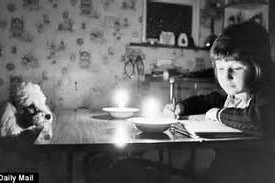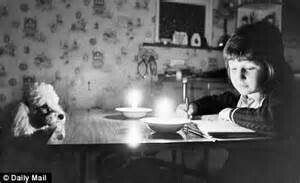
posted 10th October 2022

Energy (that is, the supply of gas and electricity to homes and businesses) is in the news right now (October 2022). Energy prices, having shot up over the summer, largely because of the war in Ukraine, have been held down thanks to subsidies from the UK government. However, as the nights get longer, the days get colder, and Russia, facing pushback from Ukraine, looks likely to restrict supplies to Europe still further, another issue looms; will we have enough energy to get us through the winter?
Dealing with scarcity is one of the fundamental problems of economics and politics. What do you do when there isn’t enough of something to go round? There are essentially two ways of approaching the issue, providing a clear point of clash. Should the government intervene to control the supply, to ensure everyone gets as much as they need, and no one goes without? Or should we allow supply to be regulated by the market, so that the less there is of something the more it will cost, and therefore the less people will buy of it?
The clash on the issue of principle is this: should we prioritise looking after vulnerable people, or should we let everyone look after themselves? Which is more important: fairness or freedom? The clash on the issue of pragmatism is this: which works better for ensuring the efficient distribution of a scarce commodity: the state or the market?
There is precedent in the UK for dealing with extreme shortages of essential goods. During the Second World War, Britain was unable to import anything from Nazi-occupied Europe, and imports from other parts of the world were threatened by German assaults on British ships. The government introduced rationing of a wide range of products, from food to clothing to fuel. People were issued with ‘ration books’, containing coupons they could exchange in shops. If you ran out of coupons for butter, you couldn’t buy butter. Food rationing continued until 1954, nine years after the end of the war. No one starved because of rationing; in fact, the overall health of the population improved, because everyone was eating a balanced diet. However, there was a thriving black market, which allowed people to (illegally) evade rationing; you could get what you wanted if you knew the right people and could afford to pay a bit more. So-called ‘spivs’ made themselves very rich supplying items on the ration.
In the early 1970s, there were two prolonged strikes by coal miners. As electricity stations were, at the time, powered by coal, this led to a severe shortage of electricity. At first, this was managed by the government imposing temporary blackouts of three or more hours. You would be sitting at home and suddenly the TV would go off and the lights would go out. Anyone who (like me) grew up in the 1970s has vivid memories of doing their homework by candlelight, wrapped in as many layers as they could muster. As the second strike dragged on, the government imposed a ‘three day week’ in early 1974; businesses and shops were only allowed to open for three days a week to save power.
These historical precedents offer two possible mechanisms for dealing with energy shortages. The Second World War example involves a huge amount of government intervention to manage and control people’s behaviour. In its favour, this method of rationing does allow for a more nuanced approach. So, for example, older people, or people who have medical needs which mean they require more heat in their households, could be granted an exemption from rationing, as could hospitals and schools. Also, government rationing of energy would arguably be less liable to abuse than the rationing of goods in wartime; a spiv is going to find it a lot harder to let you have a few more hours of electricity or gas in return for a consideration than they would once have slipped a lamb chop or a pair of silk stockings under the counter. Against this approach is the removal of people’s freedom of choice: if I can afford to have the heating on all day, why shouldn’t I?
The blunt instrument of occasional blackouts has the virtue of simplicity. If they are announced in advance, people can plan their activities accordingly (getting in candles, planning early nights etc.). They are also in some ways fairer, as everyone experiences them equally. The extreme lockdown of the early months of the Covid 19 pandemic generated a surprising, and indeed inspiring, sense of solidarity in the British people. As we were all in it together, people tolerated the restrictions more equably than expected, and looked after each other. Against this approach, it can be argued that it is a very extreme form of government control, effectively shutting down large parts of the country whether we like it or not. At least with rationing we can choose how we use our energy, even if we have less of it; if we have an important family event, or a key event at a business, on a particular evening, we can save up energy for it.
Finally, there is the libertarian, free market approach. If there is less energy to go round, charge more for it, and people will use it less. In its favour, this approach is very simple; the government does not have to intervene at all. It also leaves people with absolute freedom to do what they wish with their money and their lives. The government should not tell us how to live, say libertarians. Against this approach, however, is the argument that energy is a necessity, not a luxury. If the price of foreign travel goes up, and you have to cancel that planned holiday in the Canary Islands, you might suffer disappointment, but nothing worse. If the price of gas and electricity climbs too high, vulnerable people may no longer be able to cook their food or heat their house, with serious health consequences. Moreover, if there’s not enough to go round, and rich people use up what there is, essential services such as hospitals and schools may no longer be able to function. Switching off life support machines because a millionaire in a mansion wants to keep all his thirteen bedrooms toasty warm is hard to defend either morally or pragmatically. The market works well for some areas of the economy; for others, it is not appropriate.
The debate around energy rationing can be boiled down to a key point of clash in politics and economics, which recurs across many debates: should we prioritise the individual, or the common good?
Keep warm this winter, one way or another!
Motions that go with this topic:
- This house would introduce rationing of domestic energy supplies
- This house would ration energy supplies to businesses
- This house would introduce shorter working days to manage energy shortages
- This house would use blackouts to manage energy shortages





